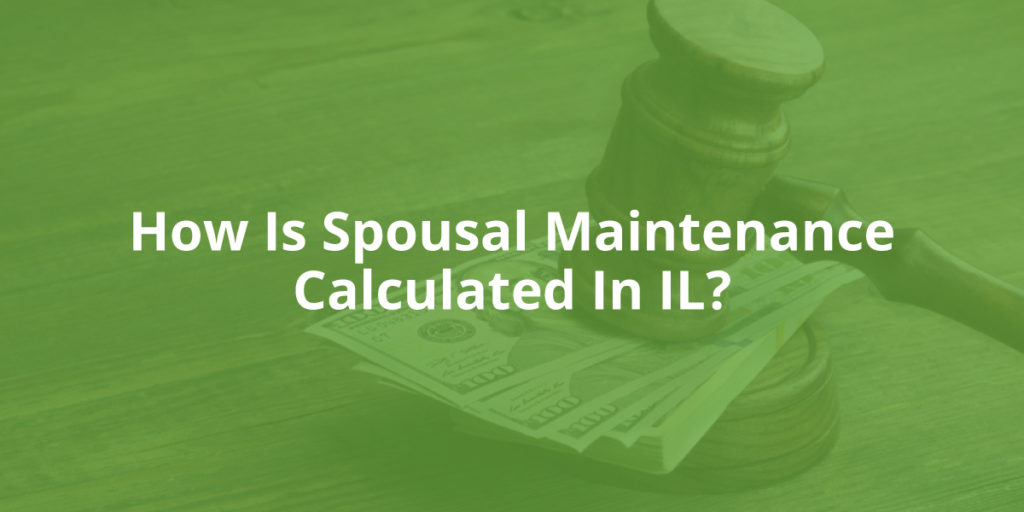
How is Spousal Maintenance Calculated in Illinois?
If you face divorce in Illinois, you may have questions about spousal maintenance–also known as alimony. One of the most pressing questions on your mind might be, “How is spousal maintenance calculated in Illinois?”
It’s natural to feel apprehensive about supporting yourself after years of focusing on your family or about the impact of maintenance payments on your financial future. Rest assured, Illinois law provides a framework for calculating spousal maintenance that aims to be fair and equitable.
Read on to learn more about how family courts in Illinois calculate spousal maintenance. To learn how spousal maintenance may be calculated in your case, and to get answers to your question regarding your situation, contact a spousal maintenance attorney near you for a free and confidential consultation.
Understanding Spousal Maintenance in Illinois

Spousal maintenance (alimony) is financial support that one spouse pays to the other after a divorce. Its purpose is to help the recipient spouse maintain a reasonable standard of living, similar to what they experienced during the marriage.
In Illinois, spousal maintenance isn’t automatically awarded in every divorce case. Instead, the court considers various factors to determine whether maintenance is appropriate and, if so, how much should and for how long.
Some key factors the court considers include:
- The income and property of each spouse
- The needs of each spouse
- The present and future earning capacity of each spouse
- Any impairment of earning capacity due to devoting time to domestic duties or forgoing education or career opportunities due to the marriage
- The time necessary for the recipient spouse to acquire appropriate education, training, and employment
- The standard of living established during the marriage
- The duration of the marriage
- The age and health of both spouses
- Contributions by one spouse to the education, training, or career of the other spouse
Illinois’ Spousal Maintenance Formula
In 2015, Illinois introduced a formula for calculating spousal maintenance to provide more consistency and predictability in divorce cases. This formula applies to couples with a combined gross income of less than $500,000 and in cases where the payor doesn’t have to pay child support or maintenance from a previous relationship.
Here’s how the formula works:
- Take 33.3% of the payor’s net annual income
- Subtract 25% of the recipient’s net annual income
- The difference is the annual maintenance amount
However, there’s an important caveat: The total amount of maintenance plus the recipient’s net income cannot exceed 40% of the combined net income of both parties. If it does, the court will reduce the maintenance amount to meet this threshold.
For example, if the payor’s net annual income is $100,000 and the recipient’s is $30,000:
- 33.3% of $100,000 = $33,300
- 25% of $30,000 = $7,500
- $33,300 – $7,500 = $25,800 (annual maintenance)
In this case, we’d need to check if $25,800 + $30,000 (recipient’s income) exceeds 40% of the combined net income ($130,000). Since it doesn’t, the calculated amount stands.
Determining the Type of Maintenance

Once the court establishes the amount of maintenance, it must determine the duration and type of maintenance. Illinois recognizes several types of spousal maintenance:
Fixed-term Maintenance (Generally Rehabilitative Maintenance)
This type of maintenance is awarded for a specific period, typically in shorter marriages or when the recipient spouse needs time to become self-supporting. The goal provides temporary support while the recipient spouse gains the education, training, or work experience to reach financial independence.
For marriages lasting less than 20 years, the court calculates the duration of maintenance by multiplying the length of the marriage by a factor specified in Illinois law. For example, for a five-year marriage, the factor is 0.20, so one spouse would pay the other maintenance for one year (5 x 0.20 = 1).
Indefinite Maintenance (Generally Permanent Maintenance)
For marriages lasting 20 years or more, the court may award permanent or indefinite maintenance. This doesn’t necessarily mean it lasts forever, but it continues until a significant change in circumstances occurs or the court modifies the order
Courts typically award permanent maintenance in cases involving long-term marriages, older spouses, or situations where one spouse will not likely become self-supporting due to age, health, or other factors.
Reviewable Maintenance
In some cases, the court may award reviewable maintenance. The court sets this maintenance for a specific period but allows for review at the end of that period. During the review, the court assesses the need for continued maintenance based on the parties’ circumstances at that time.
How an Attorney Can Help
As with any aspect of divorce, you need an attorney to help you navigate the complex process and protect your rights and interests.
A lawyer can:
- Assess your specific situation and advise on the likelihood of maintenance
- Help you gather and present the necessary financial information to support your case
- Calculate potential maintenance amounts based on Illinois law and your unique circumstances
- Negotiate with your spouse’s attorney to reach a fair maintenance agreement
- Represent your interests in court if an agreement can’t be reached through negotiation
- Advise on tax implications of spousal maintenance payments
- Help you understand your rights and obligations regarding spousal maintenance
- Assist with post-divorce modifications if circumstances change significantly
While the formula provides a starting point, judges can deviate from it based on specific circumstances. An experienced attorney can argue effectively for adjustments when appropriate.
Contact Our Illinois Alimony Attorney Today
Whether you’re seeking spousal support in Illinois or believe you may have to pay, don’t hesitate to reach out for help. The compassionate and skilled attorneys at Manassa Law P.C., have years of experience in Illinois family law, and we understand the nuances of spousal maintenance calculations and negotiations.
We know that every divorce case is unique, and we’re committed to providing personalized, attentive service. Our attorneys will take the time to understand your specific situation, explain your options clearly, and work tirelessly to protect your rights and financial interests.
Don’t let uncertainty about spousal maintenance add to the stress of your divorce. Contact our Barrington family and divorce attorneys at Manassa Wieczorek, P.C. today for a free, confidential consultation. We’ll listen to your concerns, answer your questions, and provide the guidance you need to move forward with confidence.
- Income Disparity and Child Support in Illinois - January 15, 2026
- How Is Child Custody Determined in Illinois? - January 14, 2026
- How Do I Adjust Time Sharing to Accommodate New Circumstances? - January 13, 2026
